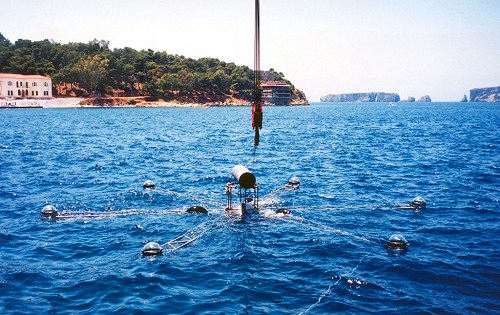Nestor: unravelling the universe’s mysteries from the bottom of the sea
More than 2,000 years before the scientific means were developed to prove the existence of atoms, ancient Greeks already theorised about their existence. Their descendants continue to be at the forefront of scientific research as shown by the Nestor project in Pylos, in southwestern Greece. This involves creating an underwater telescope at the bottom of the Mediterranean Sea. It will track neutrinos in a bid to unravel some of the universe’s biggest mysteries.

In Pylos an underwater telescope is being developed to help track neutrinos.
Neutrinos, as American physicist Dr Frederick Reines explained, are “the tiniest quantity of reality ever imagined by a human being”. Travelling at the speed of light and unaffected by magnetic fields, neutrinos cross the earth carrying invaluable information from distant astrophysical sources. Knowing more about them, means understanding how the universe was made and operates.
However, accurately tracking them proves very challenging. Cosmic rays hitting the earth’s surface can distort the readings, however they can be blocked by placing a telescope to detect them deep under water.
Nestor, which stands for Neutrino Extended Submarine Telescope with Oceanographic Research and also shares its name with Homer's king of Pylos, is being developed for that reason. Once finished, it will be installed at a depth of 5,200 metres some 30 kilometres away from the Peloponnese mainland.
It will most likely be co-funded by Horizon 2020, the EU’s flagship innovation and research programme, which between 2014-2020 will allocate €80 billion to research, innovation and technological developments in the member states.
“The EU has significant technology capabilities and can showcase its highly skilled scientists through this initiative," said Dr Giorgos Stavropoulos, a distinguished physicist in the Institute of Nuclear and Particle Physics (INPP), responsible for the experiment. Nestor could also be used to record seismological, oceanographic and other environmental data.
As with other infrastructure projects co-funded by the EU Structural Funds and the European Strategy Forum on Research Infrastructure, Pylos is feeling the benefits, becoming more attractive to companies. In a country that is struggling to exit the current economic crisis, this experiment comes as a great opportunity for economic development.
Source: European Parliament
- 288 reads
Human Rights
Fostering a More Humane World: The 28th Eurasian Economic Summi

Conscience, Hope, and Action: Keys to Global Peace and Sustainability

Ringing FOWPAL’s Peace Bell for the World:Nobel Peace Prize Laureates’ Visions and Actions

Protecting the World’s Cultural Diversity for a Sustainable Future

Puppet Show I International Friendship Day 2020

